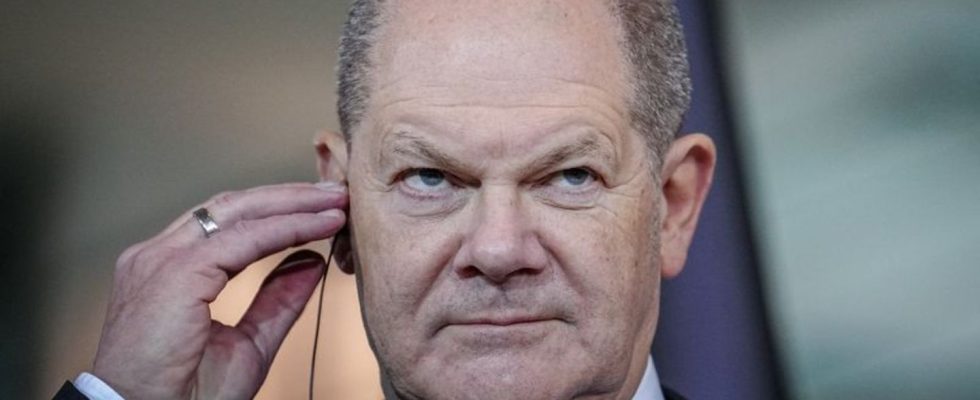budget
Government: Budget negotiations very advanced
“But we have made so much progress that you can be very confident that we will be able to communicate the result to you soon,” says the Chancellor. photo
© Kay Nietfeld/dpa
Still no white smoke from the Chancellery: The traffic light coalition continues to look for ways out of the budget crisis. It is now said that a lot has already been clarified. Finance Minister Lindner is confident.
From the perspective of the Federal Finance Minister Christian Lindner, there is progress in the traffic light coalition’s negotiations about the billion-dollar hole in the budget for 2024. With a view to a schedule and the content, the FDP party leader did not let himself be seen on Monday afternoon. There is currently nothing to say, he said on the sidelines of an FDP event in Berlin. “We work very constructively – and in a very friendly and friendly atmosphere.”
Chancellor Olaf Scholz made a similar statement. The task is indeed big, said the SPD politician in Berlin. “But we have made so much progress that you can be very confident that we will be able to communicate the result to you soon.” A government spokesman said that the negotiations were “very advanced” and that many questions had already been clarified in good, confidential discussions.
Scholz has been looking for a solution to the budget crisis for weeks in three-way talks with Finance Minister Christian Lindner (FDP) and Vice Chancellor Robert Habeck (Greens). Late on Sunday evening the talks were postponed until today.
SPD leader Saskia Esken also spoke of progress. “Something will happen now. And then we will have a basis to continue to govern,” she said in the ZDF “Morgenmagazin”. All three traffic light parties had signaled that they wanted to reach an agreement.
FDP parliamentary group leader Christian Dürr contradicted speculation that his party was preparing to leave the coalition because of the unresolved budget dispute. When asked about a member survey about whether the FDP would remain in the government, Dürr said on Deutschlandfunk: “My firm wish is that we continue to be part of a federal government that continues to shape things.”
FDP reiterates its red lines
Germany is on course for reform, including when it comes to consolidating public finances. “And we shouldn’t abandon this course. If the FDP wasn’t there, things would look different in Germany, we would probably have debt levels that were similar to those in Corona times and that would be wrong,” said Dürr. It is now a matter of calmly finding a solution. “Nothing is at risk, everything that is already there in terms of statutory benefits will be paid out on January 1st.” It would not be a problem if the federal budget was not decided until next year.
At the same time, the FDP reiterated its red lines in the negotiations. Secretary General Bijan Djir-Sarai strictly rejected easing the debt brake as well as tax increases. “Tax increases would simply be poison for economic development in our country. And we don’t want that. And we won’t allow that either,” he said. Compliance with the debt brake anchored in the Basic Law is also extremely important for the Free Democrats. There are currently no requirements for declaring an emergency again. This is a central point in the debate.
After the agreement between Scholz, Lindner and Habeck, there will be a meeting on the 2024 budget in a somewhat larger group – in the coalition committee, said the Green Party leader, Ricarda Lang. “That is my very clear goal, that we will find a political agreement on the budget in December,” emphasized the co-chair. She added: “And I believe we owe that to the country and its citizens.” It is clear that there should be no budget consolidation at the expense of the poorest and most vulnerable, said Lang. The SPD also said that at its party conference last weekend, as did the Chancellor.
In an interview with the “Neue Osnabrücker Zeitung”, the deputy SPD leader and Prime Minister of Saarland, Anke Rehlinger, pushed for a political agreement this year “to give people security before Christmas”. She warned of a “savings spiral, at the end of which nothing blessed will be found.” As a solution, she could imagine suspending the debt brake for 2024, said Rehlinger. “It certainly requires effort, but we really shouldn’t shy away from it.” At the same time, she referred to high legal requirements.
Free: Would have to sue if a state of emergency was declared
The parliamentary managing director of the Union faction in the Bundestag, Thorsten Frei (CDU), did not rule out another Union lawsuit before the Federal Constitutional Court in this case. “Of course we have to look at things very closely,” he said in Berlin. As of today, he can only say: “If the coalition also wants to fix the 2024 budget by lifting the debt brake and declaring a state of emergency, then in my opinion we would have to sue against it. Because that is obviously unconstitutional.” One cannot declare the crisis to be the norm and thereby systematically circumvent the debt brake in the Basic Law.
In mid-November, following a lawsuit from the Union parliamentary group, the Federal Constitutional Court declared the reallocation of 60 billion euros in the 2021 budget to the climate and transformation fund to be null and void. The judges also decided that the federal government cannot set aside emergency loans for later years. This resulted in the current starting position for the 2023 budget, for which the debt brake is now to be suspended again afterwards, and above all for the budget for next year.

